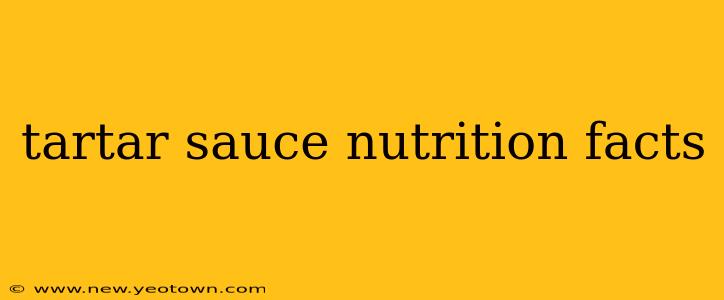Tartar sauce. That creamy, tangy condiment that elevates fish and chips, adds a zing to crab cakes, and makes even the simplest burger a culinary adventure. But have you ever stopped to consider what's in that delicious dollop? Let's embark on a journey into the world of tartar sauce nutrition facts, uncovering the caloric content, macronutrients, and potential health impacts. This isn't just about numbers; it's about understanding how this beloved condiment fits into a balanced diet.
What are the main ingredients in tartar sauce?
The foundation of tartar sauce is typically mayonnaise, a rich emulsion of oil, eggs, vinegar, and seasonings. But what truly distinguishes tartar sauce is the addition of those delightful crunchy pickles or relish. This gives tartar sauce its signature tangy flavor and satisfying textural contrast. Many recipes also include capers, which add a briny, slightly bitter element, and sometimes finely chopped onions for a subtle sharpness. The exact ingredient list can vary from brand to brand and even from homemade recipes. This variability, in fact, directly impacts the nutrition facts.
How many calories are in tartar sauce?
This is where things get interesting. The caloric content of tartar sauce is highly dependent on the specific recipe and brand. A typical tablespoon (about 15g) of commercially produced tartar sauce can range from 50 to 80 calories. Homemade versions, depending on the mayonnaise used and the amount of added ingredients, could fall within a similar range or even higher, if a richer mayonnaise is used. The primary source of these calories comes from the fat content in the mayonnaise base.
What is the fat content of tartar sauce?
The majority of tartar sauce's calories come from fat. A tablespoon often contains around 5 to 7 grams of total fat. This fat is primarily unsaturated, coming from the oil in the mayonnaise. While unsaturated fats are generally considered healthier than saturated fats, consuming large quantities of any kind of fat can still contribute to weight gain if not balanced with other aspects of your diet.
Is tartar sauce high in sugar?
Generally, tartar sauce isn't exceptionally high in sugar. The sweetness comes primarily from the pickles or relish, but this is often naturally occurring sugar, not added refined sugar. However, check the nutrition labels of your preferred brands, as some manufacturers might include additional sugars. For those watching their sugar intake, homemade tartar sauce offers greater control over ingredients and sugar content.
What are the potential health benefits or drawbacks of tartar sauce?
Tartar sauce, in moderation, isn't necessarily harmful. The mayonnaise base provides some healthy fats, while the pickles contribute vitamins and antioxidants. However, the high fat and calorie content means it should be consumed sparingly as part of a balanced diet. Overconsumption could contribute to weight gain, high cholesterol levels, and other health concerns associated with excessive fat intake.
Is tartar sauce suitable for people on a diet?
For those watching their weight, tartar sauce needs to be enjoyed very cautiously. Its high calorie and fat content make it unsuitable for regular consumption on a weight-loss diet. If you're craving that familiar tang, consider using a significantly reduced portion or opting for lighter alternatives, such as a homemade version with light mayonnaise and fewer added ingredients.
Can I make my own healthier tartar sauce?
Absolutely! Making your own tartar sauce allows you to control the ingredients and reduce the fat and calorie content. Using light mayonnaise, reducing the amount of oil, and choosing low-sodium pickles can significantly impact the nutritional profile. You can even experiment with healthier alternatives to mayonnaise, such as Greek yogurt or avocado, creating a healthier and potentially more flavorful tartar sauce.
This journey through tartar sauce nutrition facts highlights the importance of mindful consumption. While it can be a delicious addition to many meals, enjoying it in moderation and being aware of its nutritional content ensures it remains a tasty treat without compromising your health goals. Remember to always check the nutrition labels of your chosen brand and make informed choices for a well-balanced diet.

